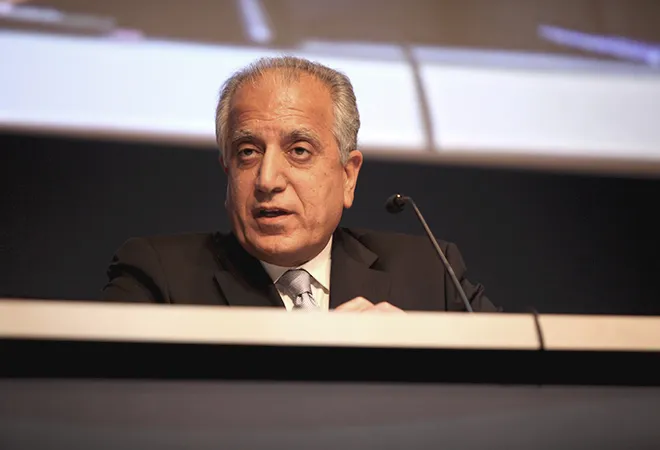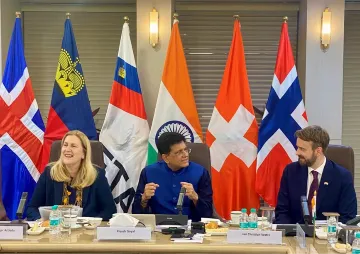
No one ever doubted that US special representative Zalmay Khalilzad got a tough mandate when he was tasked to craft a peace deal to end the “forever” war in Afghanistan.
But his mission seems to be running into difficulties abroad and out of support at home. He has lost goodwill because of his eagerness to declare victory before it is time.
Khalilzad’s willingness to talk about troop withdrawal with the Taliban without a commitment from them to open a dialogue with the Afghan government has cost him. Conservatives are unhappy because they see signs of weakness in his strategy and their support is important for President Donald Trump’s re-election campaign.
Khalilzad’s willingness to talk about troop withdrawal with the Taliban without a commitment from them to open a dialogue with the Afghan government has cost him.
The troops can’t come back in a scenario that will be interpreted as “defeat” both by Trump supporters and opponents. The US has to get a balanced deal, not one that allows the Taliban to plant their flag in Kabul and declare victory.
Khalilzad is currently in the midst of the fifth round of talks with the Taliban. According to his own statement on Twitter, he is now talking with “a more authoritative Taliban delegation.”
It begs the question about the importance of the previous four rounds with less authoritative delegations on the basis of which Khalilzad announced the basic framework for a peace agreement — Taliban will not allow international terrorist groups to operate in their territory in exchange for the US withdrawing its troops.
Khalilzad has taken a gamble without a real plan in his pocket. Yes, Trump wants to be out of Afghanistan but at the same time he doesn’t want to be accused of a hasty drawdown and jeopardising US security.
Some are already comparing his fate to that of Richard Holbrooke, the last US envoy to make a serious attempt to get a peace process going. By the end, Holbrooke was operating in isolation with zero support from the White House and President Barack Obama because of a variety of reasons — dysfunction, personality issues and over ambition being some of them. Holbrooke was reduced to canvassing senior Democratic senators to lend his mission support so that the Pakistanis would take him seriously.
So far, the Taliban have given Khalilzad nothing of substance — they have neither declared a ceasefire as he wanted nor have they agreed to talk to the Afghan government. This has been noted by Trump’s political advisors.
For all the U-turns made by Khalilzad on Pakistan — he testified in front of the US Congress in 2016 that Pakistan should be declared a state-sponsor of terrorism and demanded drone strikes on the Haqqani Network — the Pakistanis have played him this time around.
So far, the Taliban have given Khalilzad nothing of substance — they have neither declared a ceasefire as he wanted nor have they agreed to talk to the Afghan government.
The Pakistan military and the ISI are using various Taliban leaders to keep Khalilzad occupied to buy time to change the ground situation in Afghanistan even further. He has allowed himself to get into a situation where the goal of getting a real deal with the Taliban has been reduced to just getting meetings with the Taliban.
Khalilzad has failed to push Pakistan to get the Taliban leaders to talk to the Afghan government. His going soft on the Pakistanis — an evolution that has shocked many in the US administration, including key players in the Pentagon — puts him at odds with sections of the Washington establishment. A cave-in to Pakistan was not supposed to be on the cards.
If the Pakistanis are the protectors and guarantors of the Taliban leadership, having fed and armed them for decades, they should be able to create channels of communication between the Taliban and the Afghan government. Not doing so only makes the Afghan government more suspicious of Pakistan and of Khalilzad.
The original US objective was a comprehensive peace deal, which would bring the Taliban into the political process but not keep the Afghan government out.
If the Pakistanis are the protectors and guarantors of the Taliban leadership, having fed and armed them for decades, they should be able to create channels of communication between the Taliban and the Afghan government.
Also, originally there were two tracts in the peace process — the Abu Dhabi channel and the Qatar channel. The Abu Dhabi tract, which was meant to be more inclusive, seems to have gone cold. This is an additional problem for the US representative.
Given Qatar’s problems with the United Arab Emirates (UAE) and Saudi Arabia, would Khalilzad be able to swing something substantive on the Qatar channel and would Pakistan help him get there?
Khalizad’s eagerness to bring the troops home has made withdrawal more important than anything else. To leave important questions about women’s rights and education for girls to the intra-Afghan dialogue in the belief that the Americans can’t push more than what the Afghan society would bear is a cop out pure and simple.
But that is what Pakistan apologists in Washington — many of them from past US administrations — are rooting for. They want to leave the fate of Afghan girls to a future intra-Afghan dialogue because they are convinced the Taliban’s desire to be viewed as “legitimate” has made them more reasonable.
The trust-the-Taliban camp believes their medieval tendencies are a thing of the past because the Taliban crave international recognition and aid. Some even believe the Taliban were not “intimately” involved with Osama bin Laden’s enterprise. Bin Laden was paying them “for room and board” while taking advantage of the chaotic situation.
It seems Khalilzad has fallen into the apologists’ trap.
The views expressed above belong to the author(s). ORF research and analyses now available on Telegram! Click here to access our curated content — blogs, longforms and interviews.




 PREV
PREV


